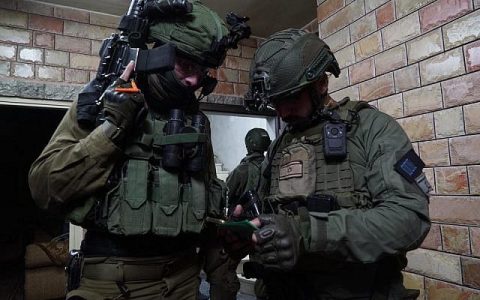
Israeli Army forces prepare demolition of suspected Palestinian terrorist’s home
Israeli security forces early Friday mapped the home of an alleged terrorist who helped carry out a deadly West Bank bombing last month, ahead of its demolition, the army said.
The Israel Defense Forces said in a statement that combat engineers measured the home of 25-year-old Yasan Hasin Hasni Majamas in the town of Bir Zeit, outside Ramallah.
Majamas was arrested last month along with three other Palestinian men suspected of carrying out a deadly terror bombing at a West Bank natural spring that killed 17-year-old Israeli Rina Shnerb and injured her father and brother.
The Shin Bet security service said Majamas and the others were members of a Popular Front for the Liberation of Palestine (PFLP) cell that was planning additional attacks when the suspects were arrested.
According to the Shin Bet, the cell was led by Samer Mina Salim Arbid, 44, who has been involved in terrorist activities over the years. During the Second Intifada, he served directly under the head of the PFLP in Ramallah, creating IEDs and planning attacks.
Qassem a-Karim Rajah Shibli, 25, is suspected of helping make the bomb, while Majamas is believed to have been involved in the planning and execution of the attack.
Both Shibli and Majamas have served time in Israeli prisons for their involvement in terrorist activities, the security service said.
A fourth man — Nizam Sami Yousef Ulad Mahmoud, 21 — who is suspected of being a member of Arbid’s cell, was also arrested sometime over the last month.
On August 23, an IED that had been planted next to the Bubin natural spring in the central West Bank, near the Dolev settlement, was triggered by terrorists as the Shnerb family from the central Israeli town of Lod visited the site, killing the daughter Rina and seriously injuring her father Eitan and brother Dvir, 19.
Rina Shnerb was pronounced dead at the scene. Her father and brother were taken by military helicopter to a Jerusalem hospital with serious injuries. They have since been released from the hospital.
Police sappers determined that the bomb had been planted earlier at the spring and was triggered remotely when the family approached it.
Israel says the practice of demolishing terrorists’ homes is an effective means of discouraging future attacks, though it has been criticized by human rights groups as a form of collective punishment and by some analysts as an ineffective deterrent measure.
Security forces launched a manhunt for the assailants, making the arrests throughout the month of September.
A short time after the arrests, it was reported that the alleged head of the cell, Samer Arbid, had been taken to Jerusalem’s Hadassah Hospital Mount Scopus in critical condition following his interrogation by the Shin Bet.
Arbid showed signs of improvement last week, but remained in critical condition, according to his lawyer. Mahmoud Hassan told the Ofer military court that his client Arbid was still attached to a ventilator at Hadassah Hospital with severe internal injures, including broken ribs and kidney failure.
Hassan petitioned the court for Arbid’s release due to his injuries, arguing that his client had “undergone severe torture” while in Israeli custody, according to Hebrew media reports.
The court denied the request, and ruled that due to the improvement in Arbid’s condition, the Shin Bet would likely be able to resume interrogating him “in the coming days.”
According to security sources, the Shin Bet was given permission to employ “extraordinary measures” during his interrogation. Such measures can include beatings, forcing prisoners into uncomfortable positions, sleep deprivation, shackling and subjecting prisoners to extreme temperatures.
This is typically allowed in “ticking time bomb” cases where there is concern the suspect could provide security forces with information that could prevent an imminent attack.
The Justice Ministry has launched an investigation into Arbid’s injuries, specifically probing the degree of force along with the tactics used by the Shin Bet interrogators.
Source: TOI





